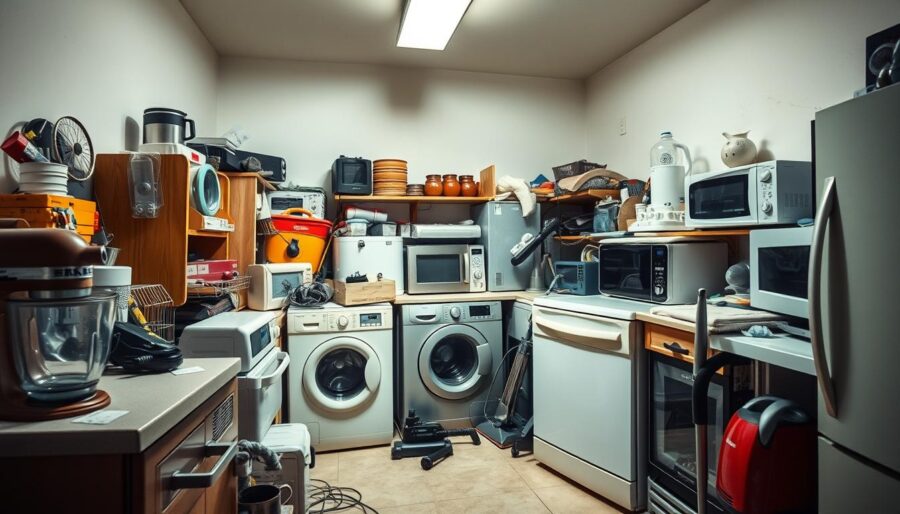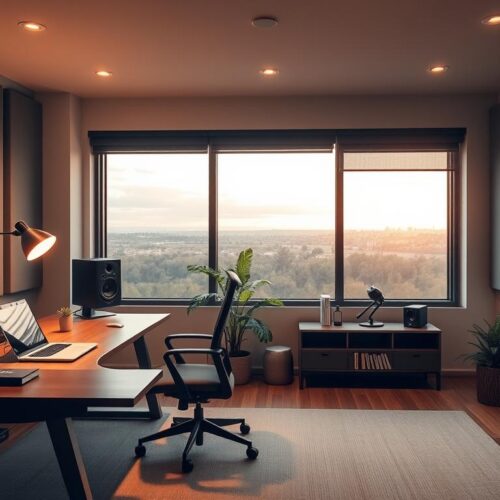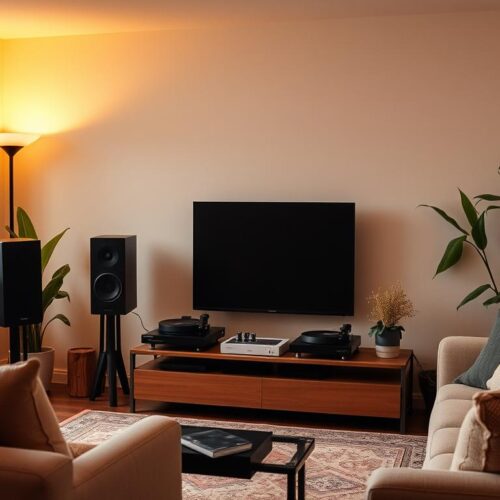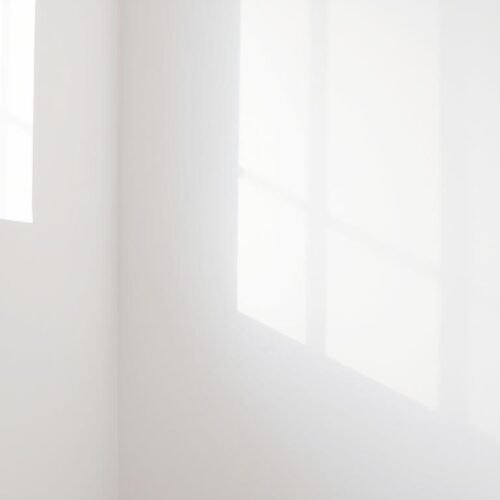Refrigerators, washing machines, and dishwashers are key in modern homes but can be noisy. This noise can majorly disrupt a baby’s sleep. Parents need to know how to control this noise to ensure a good sleep environment for infants.
Understanding Household Appliance Noise
Household appliance noise includes sounds from home devices, from soft hums to loud sounds. Knowing these noises helps you manage your home better, especially for kids.
The fridge makes a steady noise, changing in pitch with the compressor. Dishwasher sounds mix water splashes with mechanical sounds, more noticeable in silence. Washing machines have unique sounds, from filling up to spinning fast.
By knowing these noise sources, you can lessen their effect. Knowing when and where these sounds happen helps you find quieter times at home. This is key for a calm space for sleeping babies.
The Impact of Noise on Baby Sleep
It’s important to know how noise affects baby sleep. This lets us create a peaceful space for them. Sounds from home devices, like dishwashers, disrupt their sleep cycles. It makes it hard for them to get deep, healing sleep.
Studies show that steady background noise messes with sleep by breaking the smooth transition between sleep stages. This means babies might take shorter naps and wake up more at night. Such breaks can hurt their growth and how they feel each day.
The issue goes beyond just one bad night. Constant loud noises can cause lasting sleep problems. This, in turn, leads to bigger issues with their development. A quieter space is key to better sleep habits for your baby.
Notable Noisy Appliances in Your Home
Household appliances add to your home’s noise, affecting your baby’s sleep. Refrigerators, washing machines, and vacuum cleaners are the loudest.
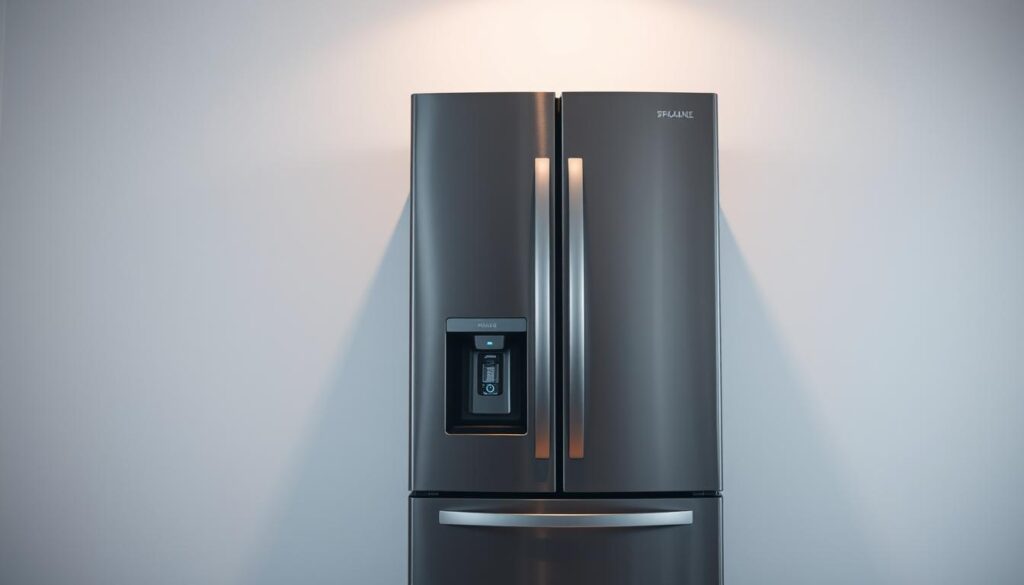
Refrigerator noise is a constant, low hum. It’s less noticed during the day but stands out at night.
The washing machine makes a lot of noise, too. Its spin cycle creates loud sounds that can wake your baby.
Vacuum cleaners, while keeping your home clean, disrupt peace with their loud noises. Using them can upset the quiet needed for your baby’s sleep.
- Refrigerator: Continuous low-level hum.
- Washing Machine: Loud bursts during spin cycle.
- Vacuum Cleaner: Variable pitches and volume.
Knowing which appliances are loudest helps manage their use. Consider quieter models for better peace at home.
Measuring Noise Levels: What You Need to Know
It’s vital to know how to measure noise levels to keep your home quiet for your baby. We use decibel measurements to understand how loud a sound is. Sounds become disruptive for your baby’s sleep when they get louder, measured in higher dB.
Using the right tools for noise monitoring is key. You can use decibel meters or smartphone apps for great accuracy. These help measure noise from household appliances, showing how loud they are. Knowing this lets you identify the loudest appliances and their active times.
| Appliance | Noise Level (dB) | Peak Activity Time |
|---|---|---|
| Vacuum Cleaner | 75 | Afternoon |
| Washing Machine | 70 | Morning |
| Dishwasher | 65 | Evening |
With noise monitoring tools, you can choose better times to use loud appliances. This reduces noise that might disturb your baby’s sleep. So, you’ll have a quieter, more peaceful home for your child.
Strategies for Reducing Appliance Noise
To make a peaceful place for your baby, it’s smart to lessen noise. Focusing on soundproofing your home is a good start. Putting insulating materials around loud tools can really help cut down noise.
Also, think about getting quieter appliances when it’s time to buy new ones. Look for ones made to be quiet. Do your homework and pick products that have low noise levels. This ensures a quiet space for your baby to sleep well.
Here’s a comparison of louder and quieter appliances to help you pick wisely:
| Appliance | Traditional Model (dB) | Quieter Model (dB) |
|---|---|---|
| Washing Machine | 75 | 50 |
| Dishwasher | 60 | 40 |
| Blender | 90 | 65 |
Using these strategies for soundproofing and choosing quieter appliances helps. It leads to reducing noise at home, making it a calm place for your baby to sleep.
Creating a Sleep-Friendly Environment
Making your baby’s room sleep-friendly is key to good sleep. Using white noise machines helps a lot. They block out loud sounds from things like fridges, offering a steady sound that’s perfect for sleeping.
In cities, where outside noise is usual, white noise machines are really helpful. Keep your baby’s crib far from noises, like windows or machines. Also, adding things like curtains and rugs can make the room quieter and sleeping easier.
- Use white noise machines to mask household and external noises.
- Position the crib away from noise sources to minimize disruption.
- Incorporate soft, sound-absorbing materials to reduce ambient noise.
Let’s look at how different sound-control methods stack up:
| Element | Benefit |
|---|---|
| White Noise Machines | Masks disruptive sounds; provides a consistent auditory backdrop. |
| Heavy Curtains | Absorb external noise; creates a darker, more sleep-inducing environment. |
| Rugs | Reduce echo and noise; add comfort and warmth to the room. |
When to Seek Professional Help
If your baby’s sleep is still troubled by noise despite your efforts, it may be time to seek professional help. A sleep specialist can explore deeper issues with noise that might disturb your child’s sleep.
Seeing a sleep specialist can pinpoint the exact noise troubles. They also look into your baby’s sleep habits to find other possible disruptions. This way, your baby gets the right help and sleeps better.
Don’t wait to get help for noise issues—it could greatly improve your baby’s sleep environment.
Maintenance Tips for Quieter Appliances
Keeping your appliances in top shape is key for a smooth and quiet operation. Wear and tear over time can make them louder. This could wake your baby up. Use noise reduction tips to keep your home peaceful.
Installing your appliances the right way can cut down on noise. If they’re not set up right, they might be louder. Follow the guide or get a pro to do it.
Regular checks can make your appliances last longer and work better. This means a quieter home. Set up a schedule for inspections and fixing anything that’s wrong.
The Role of Noise in Baby Development
Quiet places are key for a baby’s healthy growth. Noise affects infants greatly, harming their hearing and brain growth. Too much noise for too long can cause hearing loss and lead to slow language learning. A peaceful home not only helps babies sleep better but also aids in their overall development.
Research shows quiet is crucial for infants. Constant noise stresses babies, which might harm their health and development. By controlling noise at home, you can boost your baby’s learning and hearing.
Different levels of noise have various impacts on a baby’s growth. Here’s a quick overview:
| Noise Level | Potential Effects |
|---|---|
| Low (Quiet environments) | Improved sleep, better auditory development, and enhanced cognitive growth. |
| Moderate | Possible disturbances in sleep patterns and minor delays in language skills. |
| High | Significant risk of impaired hearing, disrupted sleep, and severe delays in cognitive and language development. |
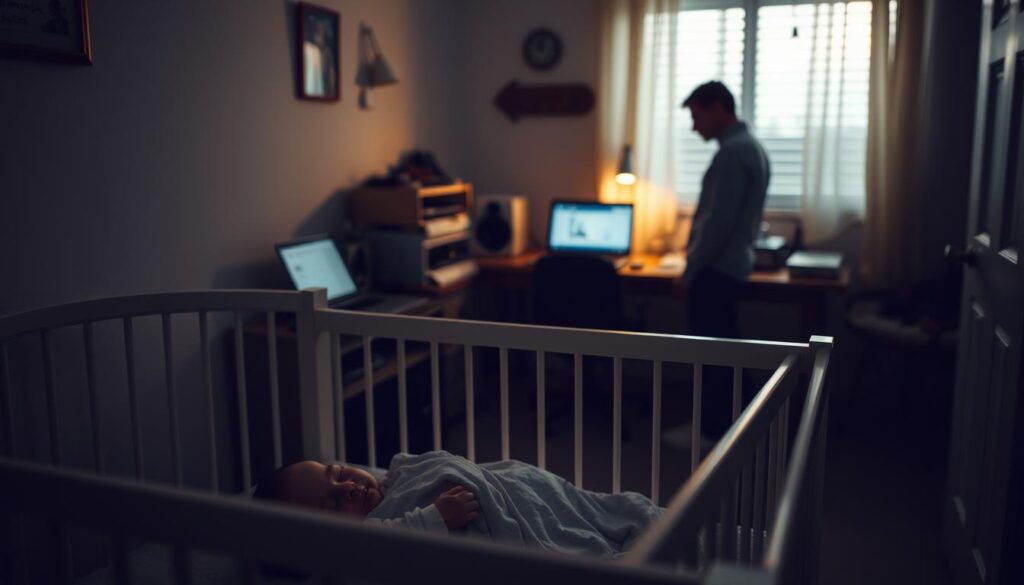
To fight the negative effects of noise, use soundproofing techniques, white noise machines, and keep a quiet routine at home. These actions will help make a peaceful environment that benefits your baby’s growth and happiness.
Frequently Asked Questions About Household Noise
Many parents worry about how appliance noise affects their baby’s sleep and growth. Knowing how to reduce noise helps create a calm space for your baby. We will answer common questions on household noise to guide you through these parental worries.
“When is the ideal time to use noisy appliances?” is a frequent question. Using loud devices like dishwashers and washing machines when your baby is awake helps. You can also find quieter options, like Bosch dishwashers or LG washing machines, designed for low noise.
Parents often wonder how to quickly soundproof their home. Simple steps include adding rugs and curtains to soak up sound, putting soft pads under appliances to lessen vibrations, and moving furniture to block noise. It’s important to keep an eye on your baby’s reactions to noise.
If you tackle common household noise issues and keep appliance noise down, you create a peaceful space for your baby. For more help, talk to a pediatrician or noise expert. They can offer advice suited to your unique needs.

